Inclusivity in Subotica: accessibility of housing for people with disabilities.
Subotica, a vibrant city in northern Serbia, is known for its rich cultural heritage and architectural beauty. However, like many urban areas, it faces challenges in ensuring inclusivity for all its residents, particularly those with disabilities. Accessibility of housing is a critical aspect of this inclusivity, as it directly impacts the quality of life for individuals with mobility challenges. This article explores the current state of housing accessibility for people with disabilities in Subotica, the initiatives being undertaken to improve the situation, and the ongoing challenges that need to be addressed.
Current State of Housing Accessibility
In Subotica, the accessibility of housing for people with disabilities remains a significant concern. Many residential buildings, particularly older structures, lack essential features such as ramps, wide doorways, and accessible bathrooms. These barriers can make it difficult for individuals with mobility impairments to navigate their own homes, leading to social isolation and decreased independence. Furthermore, the absence of accessible public transportation exacerbates the issue, limiting the ability of individuals with disabilities to seek alternative housing options.
The local government has recognized the importance of addressing these accessibility issues, yet progress has been slow. While new housing developments are increasingly designed with accessibility in mind, many existing buildings remain unchanged. This discrepancy highlights the need for a comprehensive approach that not only focuses on new constructions but also retrofitting older buildings to meet accessibility standards. The lack of awareness among property owners and developers about the importance of inclusive design further complicates the situation.
Additionally, the financial implications of making housing accessible can be a barrier for many landlords and homeowners. The costs associated with renovations and modifications may deter property owners from investing in accessibility improvements. As a result, individuals with disabilities often find themselves in a challenging position, forced to compromise on their living conditions or remain in unsuitable housing situations.
Initiatives for Improvement
In response to the pressing need for accessible housing, various initiatives have been launched in Subotica aimed at improving the situation for people with disabilities. Local NGOs and advocacy groups have been instrumental in raising awareness about the importance of inclusivity and accessibility in housing. These organizations work closely with the government to promote policies that support the construction and renovation of accessible homes.
One notable initiative is the collaboration between the city government and disability advocacy groups to create a comprehensive accessibility plan. This plan outlines specific goals and timelines for improving housing accessibility, including the establishment of financial incentives for property owners who make necessary modifications. By fostering partnerships between stakeholders, Subotica aims to create a more inclusive environment for all residents.
Furthermore, community awareness campaigns have been launched to educate the public about the challenges faced by individuals with disabilities. These campaigns emphasize the importance of empathy and understanding, encouraging residents to advocate for more inclusive practices in housing and urban planning. By fostering a culture of inclusivity, Subotica can work towards creating a city that accommodates the needs of all its residents.
Ongoing Challenges
Despite the positive initiatives underway, several challenges remain in the pursuit of accessible housing for people with disabilities in Subotica. One of the primary obstacles is the lack of enforcement of existing accessibility regulations. While laws may exist to promote inclusivity, their implementation is often inconsistent, leaving many individuals without the support they need. Strengthening the enforcement of these regulations is crucial to ensuring that all housing options are accessible.
Another significant challenge is the limited availability of affordable housing that meets accessibility standards. Many individuals with disabilities rely on social assistance or fixed incomes, making it difficult to afford housing that has been modified for accessibility. The gap between the demand for accessible housing and the supply of affordable options continues to widen, leaving many individuals in precarious living situations.
Lastly, societal attitudes towards disability can hinder progress in creating an inclusive housing environment. Stigmas and misconceptions about disabilities may lead to discrimination in housing practices, making it difficult for individuals with disabilities to secure suitable accommodations. Addressing these societal attitudes through education and advocacy is essential for fostering a more inclusive community in Subotica.
In conclusion, while Subotica has made strides towards improving housing accessibility for people with disabilities, significant challenges remain. The current state of housing accessibility reflects a need for continued advocacy, policy enforcement, and community engagement. By prioritizing inclusivity and addressing the barriers faced by individuals with disabilities, Subotica can work towards becoming a model city for accessibility and inclusivity. The journey towards a fully accessible environment requires collective effort, but the potential benefits for all residents make it a worthy endeavor.


